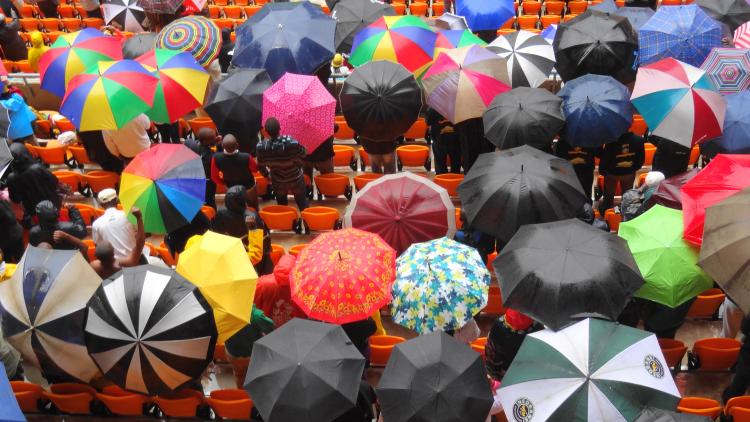Dr Ret’sepile Makamane

Key information
- Roles
- School of Languages, Cultures and Linguistics British Academy Postdoctoral Fellow
- Department
- School of Languages, Cultures and Linguistics & African Languages, Cultures and Literatures Section
- Qualifications
- BA Theatre and Philosophy (National University of Lesotho), MA Development Studies and Gender (University of Leeds), MA Creative Writing (University of East Anglia), PhD (SOAS)
- Email address
- rm68@soas.ac.uk
Biography
Ret’sepile Makamane is a British Academy Postdoctoral Fellow at the School of Oriental and African Studies (SOAS), with a focus on African literature aesthetics in Sesotho novels.
Her PhD thesis, which is under review with Legenda Studies in Comparative Literature, examined the use of African indigenous aesthetics and metaphysics in the novel. Taking Thomas Mofolo, Lesotho’s first novelist, as the kernel of its discussion, the thesis employed comparative analysis of his three novels; Moeti oa Bochabela/Traveller to the East, Pitseng/A Search for True Love and Chaka and three novels by Basotho writers; Simon Majara’s Liate oa Mafik’a Lisiu [Liate of Mafik’a Lisiu], Bennett Makalo Khaketla’s Mosali a Nkhola [A Woman Betrayed Me], and Chobokoane Chobokoane’s Ke Lesheleshele Leo a Iphehletseng Lona [Chickens Come Home to Roost]. The novels, published between 1907 and 1992, cover three significant periods – early colonial period, Lesotho under colonialism and the post-independence era.
The thesis focus was intertextual and decolonial. It presented the interface and coevalness between local aesthetics and forms of knowledge and the novel, with a focus on the intertextuality between the novel form and Sesotho oral tales, proverbs, repetition, ideophones in Sesotho speech and oral poetry with its incumbent symbolism and imagery. It examined how the use of African indigenous knowledge systems, metaphysics and spirituality, in the African novel decolonise the ‘novel’ as a form, and how these aesthetics are liberatory. The approach provides deeper attentiveness to techniques of Sesotho/African literature which are crucial for an Africa-centred analysis, and for demonstrating continuity in Sesotho/African literary expression.
Makamane’s current postdoctoral research builds on but also departs methodologically and contextually from her doctoral research in its focus on the use of indigenous aesthetics and orality in the Sesotho novel, and examines the role of African literature in social change.
Her purpose now is to examine how Thomas Mofolo (1876-1948)’s last novel, Chaka, offers possibilities for solidarity and activism across the African continent and diaspora. Mofolo’s novel is about a protagonist, Chaka Zulu, who progresses to power against tremendous adversity but is undone by that power in the end. Makamane evaluates the adaptations of Chaka into different African contexts and languages, by Senegalese Leopold Senghor during the anticolonial period of the 1950s, and by Malian writer Seydou Badian and Zambian writer Fwanyanga Mulikita during the independence moment of the 1960s, and the post-independence adaptations by Nigerians Akin Euba and Wole Soyinka, and Ghanaian Ayi Kwei Armah, in the 1970s and 1980s. Finally, she examines a film adaptation of Thomas Mofolo’s Chaka by Diaspora filmmaker of West Indian heritage, Nicholas Beveney, currently in progress, to explore how these adaptations map a global network of writers, texts, aesthetics, politics, and resistance to imperial and colonial epistemologies and ontologies, and continuity.
Her objectives are twofold: theoretical and practical: seeking to present linkages between Global South, particularly African, literatures, and to demonstrate how literature is interlinked with political praxis. She employs theorisation on African literature which steers away from binaries and polarities and extends postcolonial theories into decolonial approaches to demonstrate the need to articulate the shared experiences of texts, and the plurality of African literary expression.
Makamane is also writing interlinked short stories based in Catford, for a collection: Catford Hill – which capture the African diversity of the small vibrant neighbourhood of Catford, with an African magical realist and Black phfantastic texture, alongside her postdoc research.
Key publications
Upcoming
- “Mofolo’s Poetics of Relation: Textual Decolonial routes – from Lesotho into Africa with Chaka”, accepted as a chapter in upcoming book, Creative Multilingualism Strand 5 - Multilingualism and Creativity in World Literature(s): Languages in Dialogue, by Open World Research Initiative consortium (OWRI), for publication in 2024.
- Thesis Monograph: Aesthetics of African Literature: The fiction of Thomas Mofolo, and Sesotho novelists who came after him, accepted for under review monograph publication, Legenda Oxford Publisher: Studies in Comparative Literature Studies in Comparative Literature.
Short Stories
- “Why Tlatlametsi Escapes to Paradise”, in One World Anthology of Stories, Oxford: New Internationalist, 2016.
- “Disco,” in We shall sometime come to someplace, Stuttgart: Akademie Schloss Solitude, 2014.
- “Monrovia Scripture”, in AGNI 73, Boston: Agni, 2011.
- “Sesotho Speakers,” in African Writing 11, Manchester: African Writing, 2011.
- “Damien’s Shoes”, in Botsotso, Johannesburg: Botsotso Literary Magazine, 2010.
- “Letter of Apology”, in Anthology of African Stories, Nairobi: Oxford University Press, 2007.
- “Borrowed Pain”, in Itch, Cape Town: Itch Magazine, 2005.


